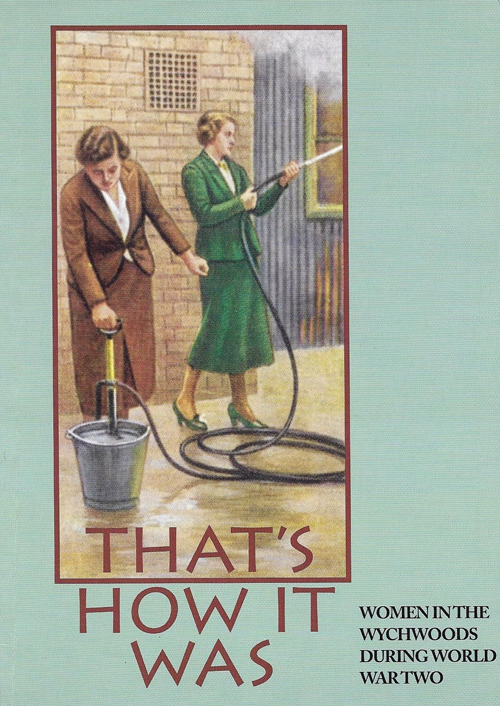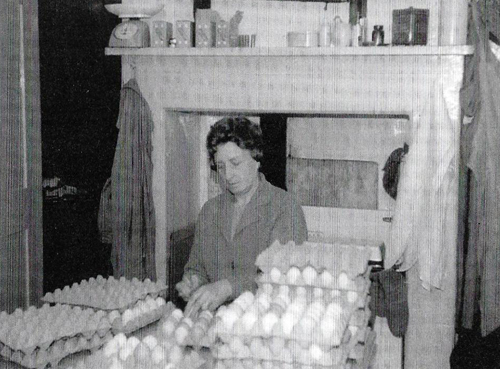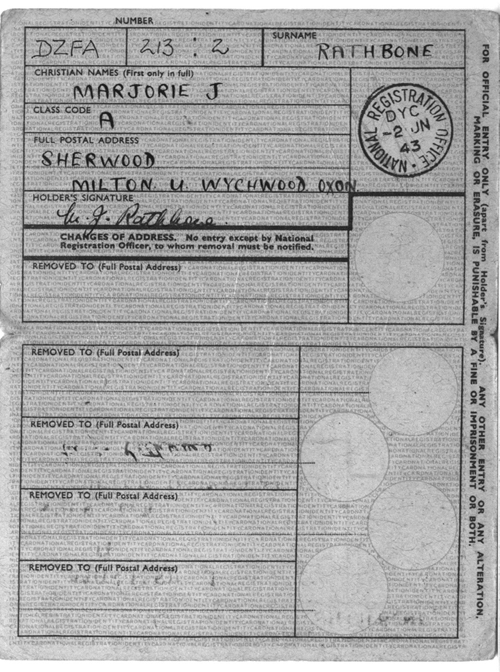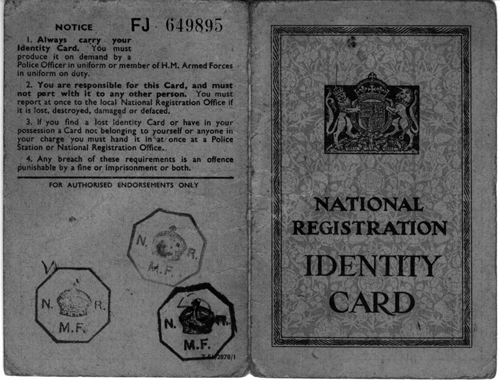“That’s How it Was” | Introduction | Wychwood Women : The Interviewees | Declaration of War | The Arrival of Evacuees| School Time | Preparing for War at Home | Soldiers and Airmen | For the Common Cause | Dr Scott and the Canteen | Domestic Life | We Were Lucky Out Here: Food Rationing | Work for Women Outside the Home | The Effects of War

… from the Wychwoods “That’s How It Was” Publication
Food rationing affected people in the Wychwoods less severely than those living in the big towns. Gardens, allotments and the fields and hedgerows of the countryside provided many supplements to the meagre if adequate rations.
‘Well I think food began to get more restricted, although we were living in a country area and therefore almost able to live on what was produced around here. I mean we had our own garden, chickens and my husband used to shoot rabbits and he got on well with the farmers who he dealt with for the corn and that sort of thing and often came home with a little surprise, bit of meat that we treasured’. Vi Smith
Vi Smith’s husband became manager of Matthew’s flour mill near the beginning of the war. Her daughter, Barbara Pearce, said ‘I don’t remember being anything but happy in my childhood. We were lucky out here. I don’t remember being hungry’.
The same thought was in Mary Barnes’ mind when asked if there was enough to eat.
‘We were very fortunate. Ivor had a big garden and he also used to shoot and fish and so we were very lucky. Rabbits. And they used to keep pigs down there with Mr Miles, Cocker Miles, they’d have one between them and then have another later on so we were very fortunate really’. Mary Barnes
Betty Brown’s father was cowman at Lower Farm, Milton. She spoke in very similar tones. Amazingly she like the dried egg!
‘We had enough to eat as we had things from the farm. Rabbits. I haven’t eaten one since. We cooked on an old fashioned black range and on oil stoves. Can’t recall any shortage of fuel. Mother was always bottling fruit and making jams. We kept a few chickens and Dad had extra cheese. We liked the dried egg; we used to mix it and do it like omelette. Tea was always short as mother was always making pots of tea, then borrowed from Lydiatts but that was always to be paid back’. Betty Brown

But it was not all rabbit pie. For the Edgintons, deer could occasionally be added to the menu.
‘Yes, well, we killed a pig of course as well so there was a bit of food there, lard and bacon and hams and Mr Davey got us what we hadn’t got’.
Where was the butcher’s shop?
‘Where Harman’s is. And we were able to shoot deer. The army were in Barrington Park; they had taken over some of the Park of Mr Wingfield. They opened the gate and let the deer out and [they] are still in the wood. And one was down in the field of our barley one evening, just before Anthony was born, July 1941, and Brian went down with a gun and shot it.
Because we got no telephone we had to go down and fetch Mr Davey up to dress it and he hung it on the cherry tree outside and dressed it in the moonlight. We shot two more after that, we did rather well with the deer. They were nothing but a nuisance, getting in and frightening the sheep, which were in the fields in pens. So they were not good news to us, to see a deer out there. As I said there is not sheep penning now so that doesn’t affect them’. Daphne Edgington
Rose Burson also grew vegetables in her garden, bottled fruit and kept hens. She had a sad tale to tell about her attempt one year to make damson jam
‘I’ll tell you something. We were allowed so much sugar for jam. I asked Mrs Edginton for some damsons because we all liked damson jam, to make some damson jam. Got the sugar. I had a notice come from Reading my Dad had had a fall. Would I go and see him. I went for the weekend. When I come back the damsons, sugar and everything had gone’.
Where did it go?
‘My mother-in-law had used them. She was always taking things‘. Rose Burson


National identity number: DZFA for Milton, 213 for household and 2 for position in family.
The doctor’s household experienced the same country fare, with the addition sometimes of goat’s milk.
‘We had chickens, we had rabbits, we had geese and we had a couple of goats but we weren’t very successful at milking and every time we’d got a bowlful, one of them would put a foot in it and we’d have to throw it away’. Betty Scott
Food was all bought locally, and Milton and Shipton each had a range of shops. Marjorie Rathbone’s years of shopping with a ration book were imprinted on her mind.
‘Even now, when I am out shopping, I can recall the order of the things that were on ration in the same order as they were in the rations books- tea, sugar, butter, marge, lard and cheese. I shopped mainly at the Post Office. We couldn’t buy cake. We preserved fruit, mainly bottled, and we grew all our own vegetables.
Horace Day kept a pig for us and we had to send it to Evesham for slaughter. We bought more land at the bottom of the garden so that we could keep chickens. Eric Meecham used to give us milk. There were extra rations for pregnant mothers, and then Peter had his own ration book which I still have for it says Rathbone Baby, as we hadn’t given him a name at the time’. Marjorie Rathbone
And Joan Hall described the meat ration. ‘If you had a tin of corned beef, you couldn’t have meat that weekend, because it just did for one ration. One tin of corned beef. It was quite a treat to get corned beef in those days‘.
Food was a constant preoccupation for any housewife during the war. Not much came in convenient tins and packs and much time was taken up with growing, digging, washing and preparing vegetables and fruit. Rationing did not end in 1945 and shortages of food continued to dominate life for years after peace was made. ‘Obviously for mother it must have been difficult, but we weren’t used to exotic food or anything different‘. Valerie Davis
Daphne Edginton was living at Crows Castle with her husband and young family and she did have to provide some things then considered ‘more exotic’. Along with coping with farming and motherhood, Daphne had a long line of prisoners of war working on the farm. ‘So I had to provide their food of course. I had to get used to cooking macaroni for the Italians and Germans who seemed to have all sorts of thing like that‘.
The difficulties and restrictions might not be tackled so resourcefully now.
“That’s How It Was” Menu
These pages are reproduced from the Society’s publication “That’s How It Was”, featuring women in the Wychwoods during World War Two. The texts and images were published in the year 2000, and deserve a place in our expanding online archive. Please bear in mind as you read our texts in these pages, that we reproduce them as published in the year of publication.
Select from:
“That’s How it Was” | Introduction | Wychwood Women : The Interviewees | Declaration of War | The Arrival of Evacuees| School Time | Preparing for War at Home | Soldiers and Airmen | For the Common Cause | Dr Scott and the Canteen | Domestic Life | We Were Lucky Out Here: Food Rationing | Work for Women Outside the Home | The Effects of War

